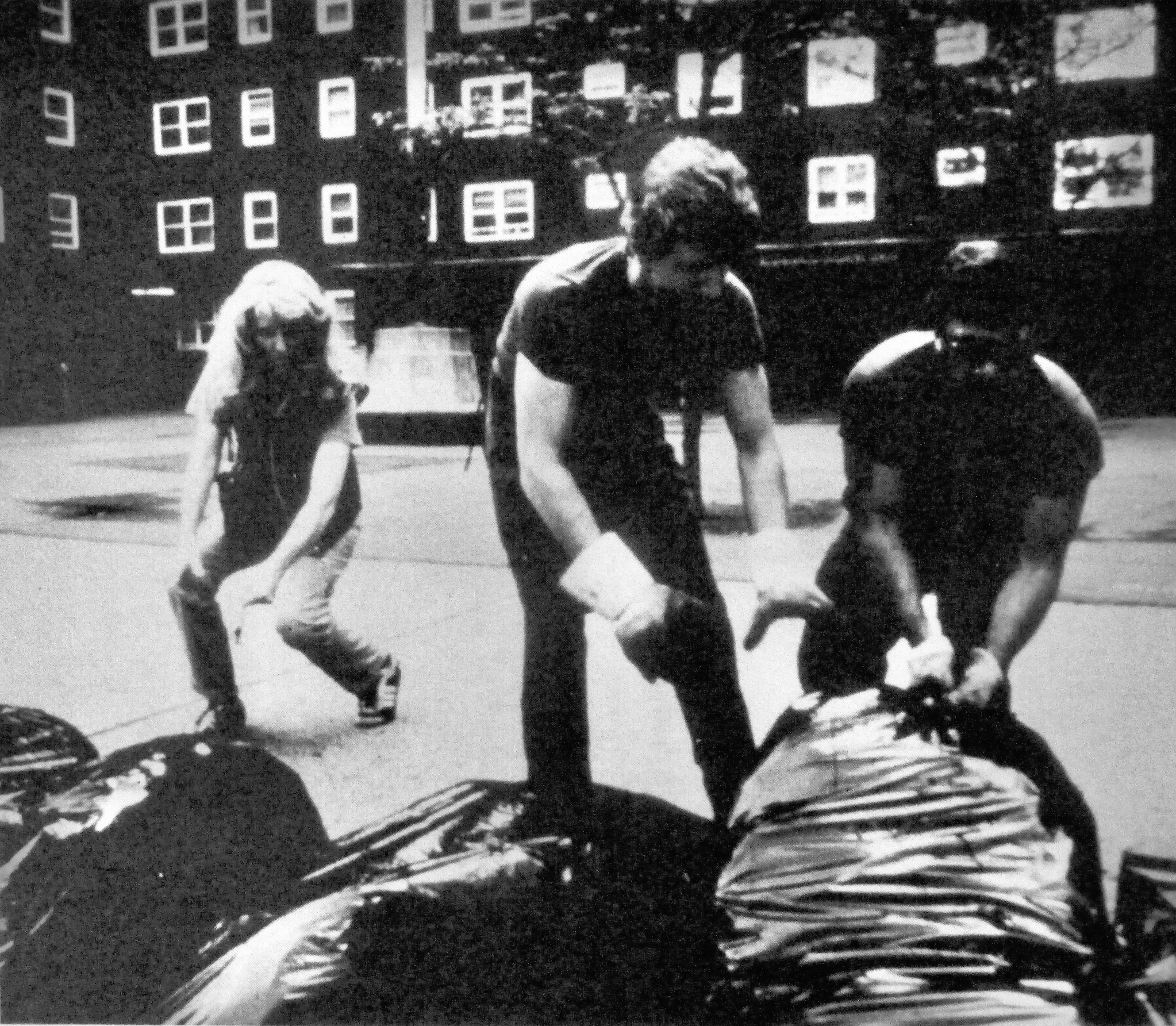
Mierle Laderman Ukeles, Artist in Residence – NYC Department of Sanitation, performing alongside sanitation workers as they keep the city clean
Why Sanitation Can Be Used As A Model For Public Art
Sanitation is the working out of the human design to accept, confront, manage, control, even use DECAY in urban life.
Sanitation, face it, is the perfect model of the inherent restrictiveness imposed by living inside our corporeal bodies, via material "necessity," in urban civilization (and its discontents), in finite planetary "reality".
We are, all of us whether we desire it or not, in relation to Sanitation, implicated, dependent – if we want the City, and ourselves, to last more than a few days. I am – along with every other citizen who lives, works, visits or passes through this space a – co-producer of Sanitation's work-product, as well as a customer of Sanitation's work. In addition, because this is a thoroughly public system, I – we – are all co-owners – we have a right to a say in all this. We are, each and all, bound to Sanitation, to restrictiveness.
Now, if that is true, how does that inextricable bond impinge on my commitment to Art in democracy as the primary system articulating the forms of (individual) freedom? What happens to the inherently "free" artist in a most mundane inherently restrictive public work system? Obversely, what happens to the notion of freedom and limitless value of a "public service" sanitation worker in this "free" society? How do these extremes relate? The contextual edges, boundaries and limits of each conflicting field-structure – free-art and social-necessity – shape, frame and ultimately define each other, in tension.
Sanitation is the principal symbol of Time's passage and the mutable value of materiality in organized urban life.
Sanitation, as an environmental energy system, is trapped in a miasma of essentially pre-democratic perceptions. The public generally doesn't 'see' beyond the tip of its nose – or see where we put our waste, or see what we do or should do with it, or see what choices we have about managing our waste. Waste is our immediate unwanted past. Do we "conserve" its energy through transformation, or do we drown in it? We are facing an environmental crisis, because we are running out of space to put it "away". To begin to accept as "ours" the difficult social task of dealing with "our" waste at the highest, not the most mediocre, level of intelligence and creativity in reality, in all its effulgent scale here, people need to understand how they connect one to the other across our society, in all its scale. We need holistic inter-connected perceptual models of how we connect and how we add up.
As a first step, we certainly need to peel away and separate ourselves from the ancient, transcultural alienating notion and aura of the caste-stigma of waste-worker, of "garbageman", which has always translated, trickily, into "their" waste, not "ours"; they're "dirty", we're "clean”.
Sanitation is the City's first cultural system, not its displaced-housekeeper caste-system. To do Sanitation is to husband the City as home. I think it can serve as a model for democratic imagination, as follows:
Sanitation serves everyone; it starts from that premise: it accepts that everyone must be served in a democracy, and the City must be maintained in working condition everywhere, no matter what socioeconomic 'culture'. Sanitation works all the time, through all seasons, no matter what the weather conditions. Sanitation is totally inter-dependant with its public: locked in – the server and the served. Sanitation, in democracy, implies the possibility of a public-social-contract operating laterally, not upstairs-downstairs, but equally between the servers and the served. This is accomplished at totality of scale; yet it deals on an incremental basis (house to house, bag to bag), and it cuts across all differences. Out of these most humble circumstances, we can begin to erect a democratic symbol of commonality.
I believe we do share a common symbol system: we are all free citizens of this City. We all [should] have equal rights. We all share responsibility for keeping the City alive. We are inherently INTER-DEPENDENT: that is the essence of living IN a City. That is simply a basic commonality; it does not deny each citizen's individuality, nor diminish the inestimable value of each living being. Rather it sets each of us in a CONTEXT of inter-dependence. We're in this together. Just as by law, we can't ship our garbage OUT, but have to deal with it IN our common 'home' manage it so doesn't destroy us, we too, all together, have to work our individual freedom out without destroying each other.
Now, here is the intersection between Sanitation as the symbol of inter-dependent reality with free art:
WORKING FREEDOM – THAT’S AN ARTIST JOB.